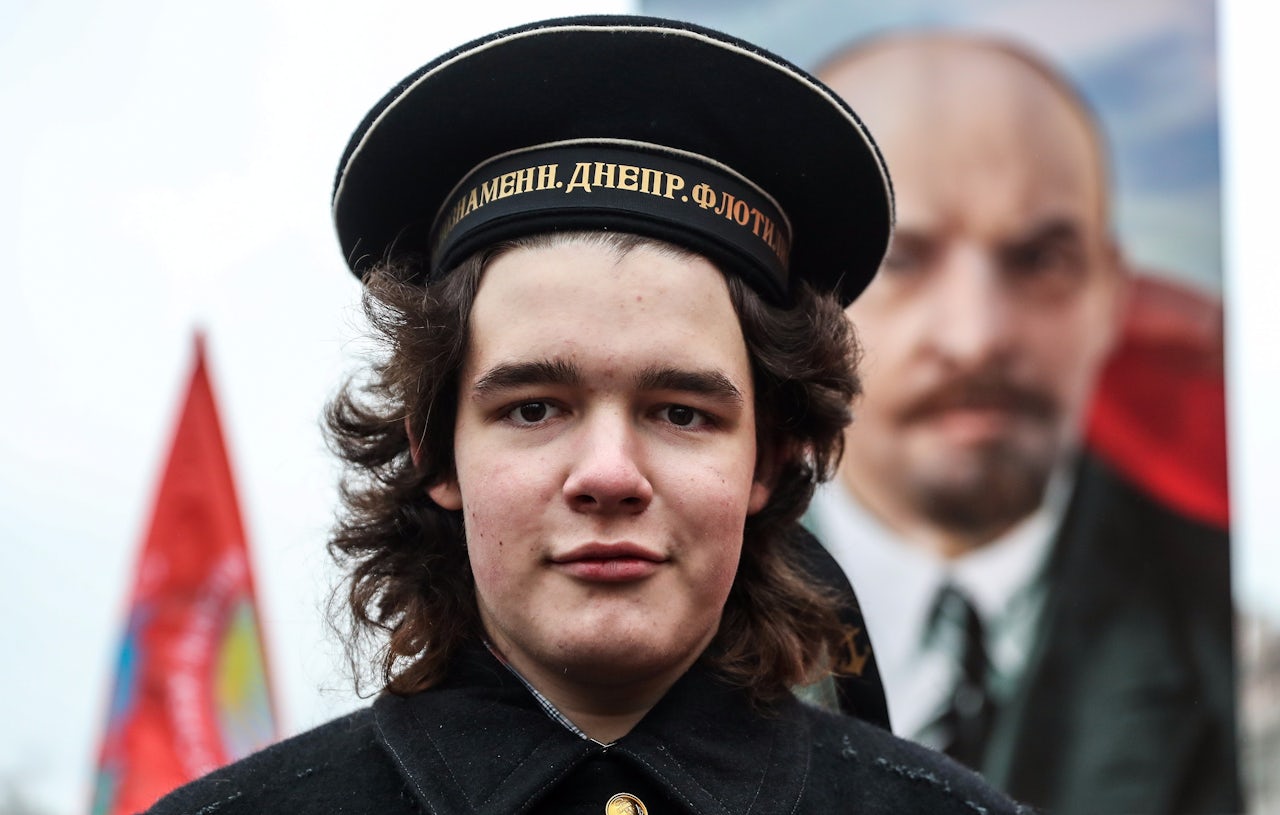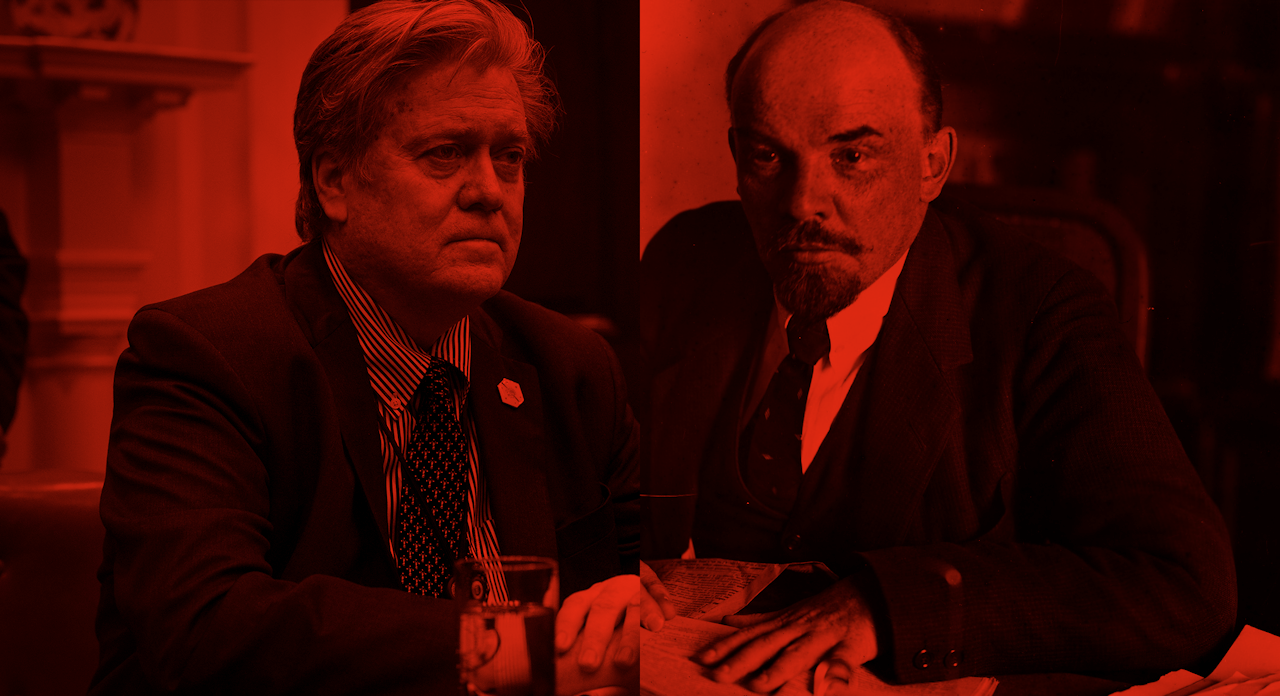For boring reasons to do with calendar adoption, November 7 marks the 100th anniversary of what is known as the October Revolution. It was really more of a coup than a revolution. In February of 1917, a broad coalition of left-wing movements forced the incompetent Tsar Nicholas II to abdicate, ending almost 400 years of rule by absolute monarchy. But in October, the Bolsheviks, a far-left Marxist party, seized power from the impotent provisional government and became de facto rulers of Russia, spurred on by their leader Vladimir Lenin’s insistent belief that only their faction represented the interests of the international working class. Memorializing the day, the British fantasy author China Mieville recently provided an excerpt of his history of the revolution, October, for Jacobin magazine. It reads a lot like a piece of fan fiction. It concludes with the morning after Bolshevik victory: “Exhausted, drunk on history, nerves still taut as wires, the delegates to the Second Congress of Soviets stumbled out of Smolny.”
Quite picturesque. Mieville’s excerpt, however, fails to mention in what came next: the Red Guards, the revolutionary militia that was ordered by the Bolsheviks to seize the Tsar’s Winter Palace in St. Petersburg, got shitfaced. As the Polish writer Isaac Deutscher illustrates in his monumental 1954 biography of Leon Trotsky, The Prophet, the glorious climax of the October Revolution was followed by a drunken debacle. The victorious Red masses got into the wine cellars and liquor cabinets of the vanquished regime. The country descended into what Deutscher calls a “truly elemental orgy of mass drunkenness” for several weeks. The memoirs of the Bolshevik military commissar Vladimir Antonov-Ovseenko show the leadership at a total loss to control the situation: “We tried to stop them by walling up the entrances [of the wine cellars.] The crowd penetrated through the windows, forced out the bars and grabbed the stocks. An attempt was made to flood the cellars with water. The fire brigades sent to do this themselves got drunk.”
The Bolsheviks had to create a special office with emergency powers to deal with the crisis, but Antonov-Ovseenko recalls even the special commissar was “unreliable;” presumably he joined in the drinking. Ultimately, only the combination of the Bolsheviks’ threats to shoot the looters, blow up wine cellars, and their eventual decision to pump the liquor into the Neva River ended the bacchanal. This was how the new worker’s republic in Russia celebrated its birth.
That republic, of course, did not last long enough to toast the centennial of its founding. Defenders of the Soviet experiment, like the French philosopher Maurice Merleau-Ponty in his 1947 book Humanism and Terror hoped the humanity of the results would eventually justify the brutality of the means. And yet dissolution of the Soviet Union in 1991 was as squalid and pathetic as its beginning in 1917: Millions sacrificed themselves so Soviet citizens could wait on long lines for food and shoddily built consumer goods. It should be a settled debate that the Soviet Union failed miserably, bringing about some of the worst human catastrophes of the 20th century.
It should be a settled debate that the Soviet Union failed miserably.
Despite all the exhaustive documentation available of all the hangings, shootings, famines, purges, show trials, Gulags, and deportations that happened as a result of the October Revolution, some current leftists seem to be enthused, if not enamored, by it as a sort of grand moment that revealed humanity’s potential for liberation. Maybe they feel this way for nostalgic or sentimental reasons, or perhaps it’s a bid to rebuild the traditions and self-respect of a left that’s been browbeaten with the list of Soviet crimes. Surely it’s also a yearning for a time when bohemian intellectuals actually directed the masses according to their pet theories.
It’s not surprising that Jacobin magazine, its name itself a throwback to the radicals in the earlier bloody revolutions in France and Haiti, is at the vanguard of the attempt to rehabilitate the October Revolution as a glorious moment for humanity (the Jacobin Club was a merciless political clique that pushed for the guillotine be used freely against the “enemies” of the revolution, but the magazine is apparently named after C.L.R. James's book The Black Jacobins, a history of the contemporaneous Haitian revolution, itself no dinner party.) In July, Jacobin editor Bhaskar Sunkara wrote an op-ed for The New York Times titled “Socialism’s Future May Be Its Past,” perhaps without realizing that’s exactly skeptics of the socialist resurgence are worried about. “We may reject the version of Lenin and the Bolsheviks as crazed demons and choose to see them as well-intentioned people trying to build a better world out of a crisis, but we must work out how to avoid their failures,” he wrote.
There is, of course, a lot of real estate in between “crazed demons” and “well-intentioned people” (well-intentioned people can certainly make a hash out of something, but when someone drives millions to their deaths, the label starts to sound ridiculous). One of the Bolshevik’s failures was the obsessive preoccupation with the past as a model for the present, as if they could capture a pattern in history. The Bolsheviks immediately began to compare themselves with the Jacobins. Suffice it to say, they found that precedent instructive — the first Red Terror in 1918 claimed at least 100,000 lives, and they were just getting started.
In 1917, Karl Marx had been dead for 34 years, but he had already analyzed what this pursuit of historical analogies was really about — a type of helpful make-believe for would-be revolutionaries. In his 1852 essay on Napoleon III’s overthrow of the French republic, The Eighteenth Brumaire of Louis Bonaparte, Marx writes, “The tradition of all dead generations weighs like a nightmare on the brains of the living. And just as they seem to be occupied with revolutionizing themselves and things, creating something that did not exist before, precisely in such epochs of revolutionary crisis they anxiously conjure up the spirits of the past to their service, borrowing from them names, battle slogans, and costumes in order to present this new scene in world history in time-honored disguise and borrowed language.” Marx’s vision of the French Revolution has the actors dressing themselves up in the togas of the Roman republic, just as the Bolsheviks would later style themselves after their French forebears.
There is a lot of real estate in between “crazed demons” and “well-intentioned people.”
Marx also remarks in that essay that all great historical figures appear twice, “the first time as tragedy, the second time as farce.” The Bolsheviks, of course, were both farcical and tragic, playing out the French revolution as an imaginary game in the middle of what was at first a drunken debauch and then a mass slaughter.
Marx thought that such exercises in historical dress-up often come at moments of “revolutionary crisis.” He also thought they could be a kind of parodic repetition of the past; a sign of a fiasco rather than a revolution. We certainly seem to be living through a crisis, but like the one Marx writes about in Eighteenth Brumaire, when a bloated, debt-ridden adventurer, the nephew of Napoleon I, managed to topple a fragile republic and establish the Second Empire, it feels more reactionary than revolutionary. Marx believed that the costume drama was a way of hiding the true meaning of what was going on, a kind of self-delusion. In reality, the actors were accomplishing some social and economic goal behind their own backs. The bourgeoisie in the French revolution used the historical grandeur of the Roman republic to accomplish the very prosaic bourgeois aim of securing private property, and once they had done that they were happy to put aside the heroic robes and get back to the business of making money.
Cynical old Marx might say that the left’s current Bolshevik cosplay is probably not indicative of the return of class consciousness to the proletarian masses. (In Marx’s telling, people rarely understand what they are really doing when they are doing it.) Maybe it’s the bohemian wing of the intelligentsia finally awakening from Gen X ennui and irony to recall fondly when it worshipped power and ran the show. But by Marx’s own standards this is not a sign of progress. Marx thought that the next revolution, the real one, the big one, “cannot take its poetry from the past but only from the future. It cannot begin with itself before it has stripped away all superstition about the past.” Maybe some of the new Marxists should listen to their prophet and, finally, just get over it.

